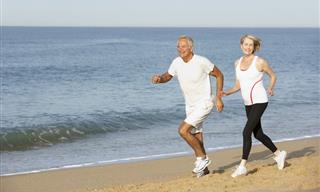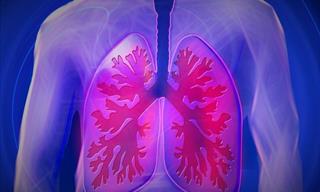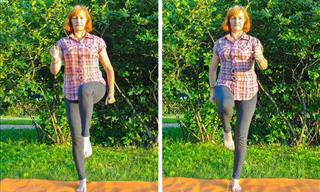Running may actually prevent you from contracting the common cold and pneumonia, a recent study suggests.
According to scientists at the US Centers for Disease Control and Prevention (CDC), engaging in consistent cardiovascular activities like jogging, swimming, or cycling can decrease the likelihood of death from influenza. Additionally, hitting the gym for a workout might also provide beneficial effects.
The National Health Service (NHS) suggests that adults engage in moderate exercise for 150 minutes a week, or participate in vigorous physical activity for 75 minutes a week. In addition, experts advise adults to perform muscle-strengthening exercises twice a week. The NHS also states that activities such as walking up stairs, swimming, or skipping can qualify as vigorous physical activity, while more intense forms of movement, such as going to the gym, meet the recommended guidelines as well.
Related: Not Just Cardio: 6 Activities That Boost Heart Health
Cardio Goals Have Advantages:

Through a comprehensive analysis of data from over 570,000 individuals over a span of 20 years, this American study examined the potential correlation between regular exercise and reduced mortality rates from influenza and pneumonia.
During the study period, 1,516 fatalities resulted from flu-related causes. However, those who achieved their cardiovascular objectives had a 36 percent lower likelihood of succumbing to the virus.
It was also found that those who had met their cardio and weightlifting targets had a 48 percent lower likelihood of dying from the flu. On the other hand, solely engaging in weightlifting without combining cardio exercises does not enhance the chances of survival compared to those who do not exercise at all.
The scientists emphasized that even if people don't meet the nationally recommended exercise guidelines, incorporating some level of physical activity can decrease the chances of dying from flu or pneumonia.
Ideal Intervals for Cardiovascular Workouts

This study, published in the British Journal of Sports Medicine, revealed that including cardio exercises for 10 to 149 minutes per week resulted in a 21% decreased risk of illness when compared to individuals who didn't exercise at all.
Curiously, it was also found that individuals who engaged in muscle-strengthening exercises daily or more faced a notable 41 percent higher risk.
“Aerobic physical activity, even at quantities below the recommended level, may be associated with lower influenza and pneumonia mortality,” the authors wrote.
Engaging in muscle-strengthening activity twice a week was linked to a reduced chance of death from influenza and pneumonia. Conversely, individuals who participated in seven or more sessions per week had a higher risk, they explained.
The outcomes of the study hold great significance, as both influenza and pneumonia are among the leading causes of death in the United States and around the world.
The study highlights that aerobic activity, often called cardio, doesn't necessarily require a strict gym routine. It includes any type of physical motion that raises your heart rate and prompts sweating, such as brisk walking, swimming, biking, running, or stair climbing.

In a December 2021 megastudy, it was revealed that effective exercise regimens contain elements such as strategic workout planning, receiving timely reminders, incorporating incentives, and discouraging consecutive instances of skipping planned workouts.
Related: Get Started on a Cardio Workout with These Beginner Tips
“If people are hoping to boost their physical activity or change their health behaviors, there are very low-cost behavioral insights that can be built into programs to help them achieve greater success,” said that study’s lead author, Katy Milkman, the James G. Dinan Professor at the Wharton School of the University of Pennsylvania.
Take it easy to begin. Allocating a mere ten minutes for exercise each day is much more manageable than most people realize. Health experts suggest considering the brevity of ten minutes when mindlessly browsing social media or watching your favorite TV show. Although it may not require a substantial time commitment, it has the potential to deliver significant health benefits.
 Go to BabaMail
Go to BabaMail






















































